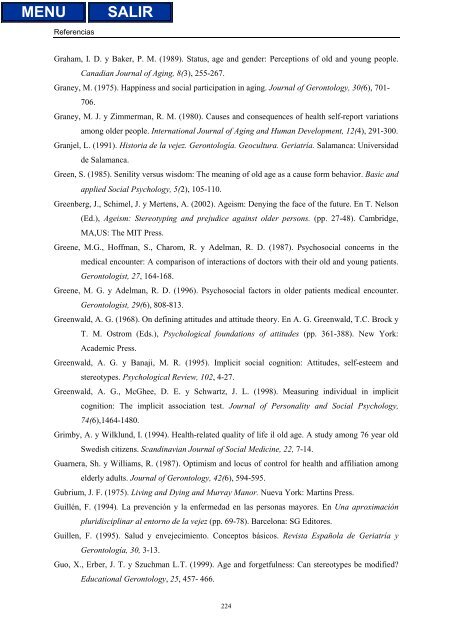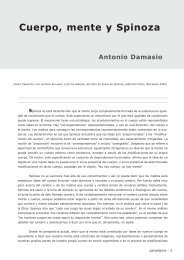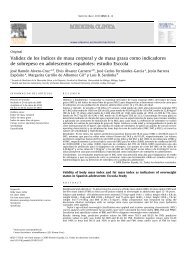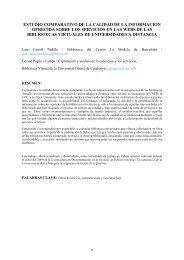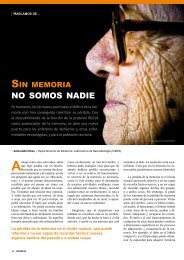Estereotipos negativos hacia la vejez y su relación con variables ...
Estereotipos negativos hacia la vejez y su relación con variables ...
Estereotipos negativos hacia la vejez y su relación con variables ...
Create successful ePaper yourself
Turn your PDF publications into a flip-book with our unique Google optimized e-Paper software.
Referencias<br />
Graham, I. D. y Baker, P. M. (1989). Status, age and gender: Perceptions of old and young people.<br />
Canadian Journal of Aging, 8(3), 255-267.<br />
Graney, M. (1975). Happiness and social participation in aging. Journal of Gerontology, 30(6), 701-<br />
706.<br />
Graney, M. J. y Zimmerman, R. M. (1980). Causes and <strong>con</strong>sequences of health self-report variations<br />
among older people. International Journal of Aging and Human Development, 12(4), 291-300.<br />
Granjel, L. (1991). Historia de <strong>la</strong> <strong>vejez</strong>. Gerontología. Geocultura. Geriatría. Sa<strong>la</strong>manca: Universidad<br />
de Sa<strong>la</strong>manca.<br />
Green, S. (1985). Senility ver<strong>su</strong>s wisdom: The meaning of old age as a cause form behavior. Basic and<br />
applied Social Psychology, 5(2), 105-110.<br />
Greenberg, J., Schimel, J. y Mertens, A. (2002). Ageism: Denying the face of the future. En T. Nelson<br />
(Ed.), Ageism: Stereotyping and prejudice against older persons. (pp. 27-48). Cambridge,<br />
MA,US: The MIT Press.<br />
Greene, M.G., Hoffman, S., Charom, R. y Adelman, R. D. (1987). Psychosocial <strong>con</strong>cerns in the<br />
medical encounter: A comparison of interactions of doctors with their old and young patients.<br />
Gerontologist, 27, 164-168.<br />
Greene, M. G. y Adelman, R. D. (1996). Psychosocial factors in older patients medical encounter.<br />
Gerontologist, 29(6), 808-813.<br />
Greenwald, A. G. (1968). On defining attitudes and attitude theory. En A. G. Greenwald, T.C. Brock y<br />
T. M. Ostrom (Eds.), Psychological foundations of attitudes (pp. 361-388). New York:<br />
Academic Press.<br />
Greenwald, A. G. y Banaji, M. R. (1995). Implicit social cognition: Attitudes, self-esteem and<br />
stereotypes. Psychological Review, 102, 4-27.<br />
Greenwald, A. G., McGhee, D. E. y Schwartz, J. L. (1998). Mea<strong>su</strong>ring individual in implicit<br />
cognition: The implicit association test. Journal of Personality and Social Psychology,<br />
74(6),1464-1480.<br />
Grimby, A. y Wilklund, I. (1994). Health-re<strong>la</strong>ted quality of life il old age. A study among 76 year old<br />
Swedish citizens. Scandinavian Journal of Social Medicine, 22, 7-14.<br />
Guarnera, Sh. y Williams, R. (1987). Optimism and locus of <strong>con</strong>trol for health and affiliation among<br />
elderly adults. Journal of Gerontology, 42(6), 594-595.<br />
Gubrium, J. F. (1975). Living and Dying and Murray Manor. Nueva York: Martins Press.<br />
Guillén, F. (1994). La prevención y <strong>la</strong> enfermedad en <strong>la</strong>s personas mayores. En Una aproximación<br />
pluridisciplinar al entorno de <strong>la</strong> <strong>vejez</strong> (pp. 69-78). Barcelona: SG Editores.<br />
Guillen, F. (1995). Salud y envejecimiento. Conceptos básicos. Revista Españo<strong>la</strong> de Geriatría y<br />
Gerontología, 30, 3-13.<br />
Guo, X., Erber, J. T. y Szuchman L.T. (1999). Age and forgetfulness: Can stereotypes be modified?<br />
Educational Gerontology, 25, 457- 466.<br />
224


